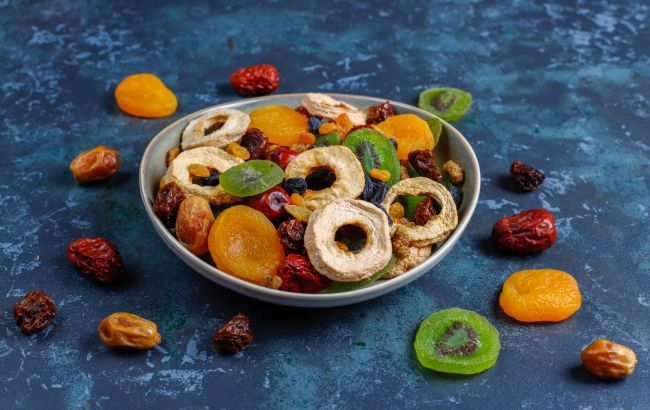Nutritionist explains whether dried fruits truly healthy and when it's best to eat them
 Benefits of dried fruits (Photo: Freepik)
Benefits of dried fruits (Photo: Freepik)
Dried fruits are not only a tasty treat but also a source of nutrients that help maintain health. However, they are best consumed at a specific time of day.
RBC-Ukraine reports on whether it's better to eat dried fruits or fresh fruits.
What are dried fruits
Dried fruits are fruits from which most of the water has been removed. In the past, people used the sun to dry and preserve fresh fruits for thousands of years.
Benefits of dried fruits
According to Ukrainian nutritionist Natalia Samoylenko, even with highly caloric and naturally sugar-rich dried fruits, a balanced approach is possible.
All dried fruits are concentrated sources of carbohydrates, and they also contain beneficial nutrients like fiber, trace elements, and vitamins.
Additionally, dried fruits contain potassium, which is good for cardiovascular health. Therefore, dried fruits can be enjoyed as a natural treat.
If you eat antioxidant-rich fruits and berries, such as raisins, dates, and dried cranberries, you’ll gain added benefits from plant phenols, which help combat inflammation.
Dried fruits are also rich in dietary fiber, which supports digestion and regular bowel movements.
During the drying process, some heat-sensitive vitamins, like vitamin C, may decrease slightly, but most of the essential vitamins, nutrients, and minerals are preserved.
When to eat dried fruits
The nutritionist recommends consuming no more than 20-30 grams of dried fruits per day, avoiding other sweets. It's best to eat them in the first half of the day, for example, with a cup of coffee.
The drying process concentrates natural sugars in fruits. For instance, 100 grams of fresh apple contains 10 grams of sugar, while 100 grams of dried apple has 57 grams.
Additionally, some producers add extra sugar to dried fruits to enhance their flavor. You can check if sugar has been added to a product by reviewing the ingredient list.
It's also essential to note that fresh fruits provide more hydration, as most fruits and berries are 80% to 90% water by weight.
Drying preserves fruits that might otherwise spoil in your refrigerator, extending their shelf life from days to months.
Sources: Instagram page of Ukrainian nutritionist Natalia Samoylenko and the Harvard Health website.
This material is for informational purposes only and should not be used for medical diagnosis or self-treatment. Our goal is to provide readers with accurate information about symptoms, causes, and methods of detecting diseases. RBС-Ukraine is not responsible for any diagnoses that readers may make based on materials from the resource. We do not recommend self-treatment and advise consulting a doctor in case of any health concerns.

